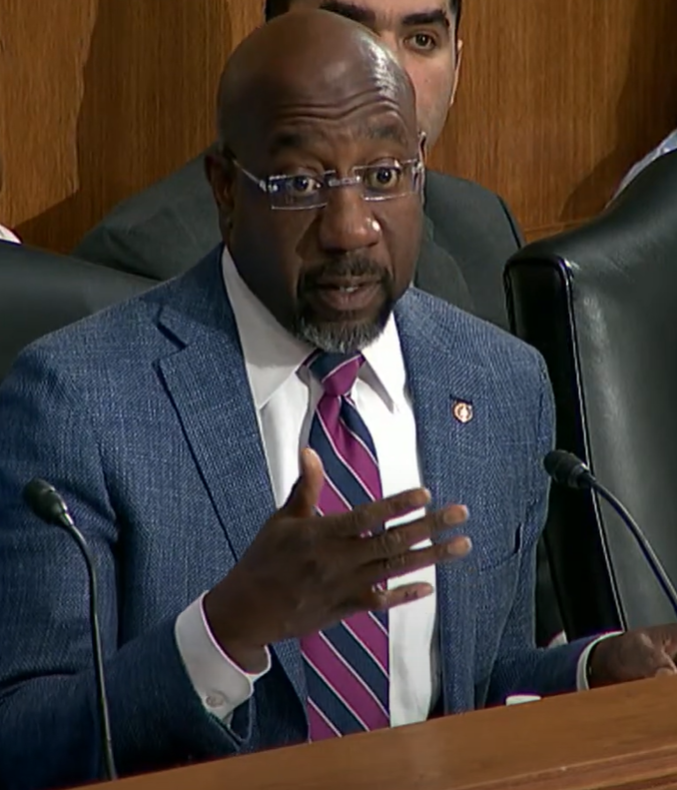At a Tuesday Senate Banking committee hearing focused on sanctions, illicit finance, and terrorism, Senator Reverend Warnock pressed the Treasury Department on the potential damage untargeted sanctions can inflict on innocent populations
During the hearing, Senator Reverend Warnock questioned Deputy Treasury Secretary Adewale “Wally” Adeyemo about the Department’s recent guidance on providing humanitarian assistance to the Palestinian people without inadvertently financing Hamas
Senator Reverend Warnock’s questioning underscored the importance of U.S sanctions achieving their intended goal without punishing innocent civilians
Senator Reverend Warnock: “I remain concerned that untargeted sanctions may only harm the poorest of the poor throughout the world. Oftentimes economic sanctions, as well-intentioned as they may be, are not felt by the governing class, the people that are actually making the decisions”

Watch Senator Reverend Warnock at Tuesday’s hearing HERE
Washington, D.C. – Today, U.S. Senator Reverend Raphael Warnock (D-GA), a member of the Senate Banking committee, questioned Deputy Treasury Secretary Adewale “Wally” Adeyemo on what steps the Treasury Department is taking to ensure U.S. sanctions have the desired impact on bad actors while avoiding inflicting damage and hurting unintended and innocent populations.
Senator Warnock questioned the Treasury Department’s findings following a review of its sanction practices and its unintended harm on civilian populations. The review was initiated and led by Deputy Secretary Adeyemo following his appointment in 2021.
“I remain concerned that untargeted sanctions may only harm the poorest of the poor throughout the world. Oftentimes economic sanctions, as well–intentioned as they may be, are not felt by the governing class, the people who are actually making the decisions,” said Senator Reverend Warnock. “Instead, they’re felt by the poor and the meek.”
The Senator has focused on ensuring U.S. sanctions are effective and narrowly targeted. In October 2023, the Senator urged the Treasury Department and White House to investigate and halt the illicit usage of cryptocurrency by Hamas, the Palestinian Islamic Jihad (PIJ), and Hezbollah for money laundering and financing of their operations, including the recent terrorist attacks on Israel by Hamas. Later that month, the Senator questioned witnesses during a Senate Banking committee hearing on how the U.S. can combat crypto financing of terror.
Watch the Senator’s full remarks and line of questioning HERE
See below a transcript of key exchanges between Senator Warnock and Deputy Treasury Secretary Adewale Adeyemo:
Senator Reverend Warnock (SRW): “I remain concerned that untargeted sanctions may only harm the poorest of the poor throughout the world. Oftentimes economic sanctions, as well-intentioned as they may be, are not felt by the governing class – the people who are actually making the decisions.”
“Instead, they’re felt by the poor and the meek. Those with little say over the activities of those in power, they’re literally caught in the crossfire. There’s an old African statement that ‘when Elephants fight, the grass suffers.’”
“Deputy Secretary Adeyemo, shortly after you took office in 2021 you led a broad review of the sanctions administered and enforced by the Treasury Department. What were the review’s findings regarding how we can best ensure that our sanctions have the intended effect and deter bad behavior?”
Deputy Treasury Secretary Adewale Adeyemo (AA): “Senator, I appreciate you asking this question, because I think it is an issue that we don’t speak enough about which is that we need to make sure that our sanctions are targeted toward the threat actors, and we do as much as possible to reduce the harm against innocent individuals.”
“That’s why one of the findings of the Sanctions review was the need to have very clear humanitarian carve-outs for the vast majority of our sanctions programs. In addition to that, we needed to make sure that these sanctions are tied to a clear foreign policy objective.”
SRW: “It’s so important that the sanctions do what they’re actually intended to do and that we don’t create needless harm on suffering and innocent people who are already marginalized.
“Speaking on humanitarian aid, you talked about these humanitarian carve-outs as part of your response given the findings of the study. As you know Gaza is experiencing right now a humanitarian crisis at unspeakable levels. […] We must ensure that U.S. policy is not standing in the way of providing urgent humanitarian assistance to Palestinian civilians, particularly the children.”
“At the same time, there is a real risk of terrorist groups like Hamas diverting aid for its own benefit. That’s why I was glad to see Treasury issue guidance on providing humanitarian assistance to the Palestinian people without inadvertently financing Hamas very shortly after October 7th. […] Can you update us on the implementation of this guidance regarding issuance of general licenses and regarding oversight?”
AA: “One of the early things we did after Hamas’ brutal attack on Israel, was take action to go after Hamas’ finances. But we also sat down with financial institutions and humanitarian groups to make sure that they had the ability to continue to provide legitimate aid and financial assistance in Gaza.”
“My goal and my team’s goal is to continue to meet with financial institutions, but also with aid groups to ensure that our sanctions are in no way prohibiting the legitimate flow of financial resources and other resources into to Gaza.”
“Because to your point, I agree that not enough is being done, not enough is getting through and we have to do everything in our power to make sure that we change that dynamic.”
###